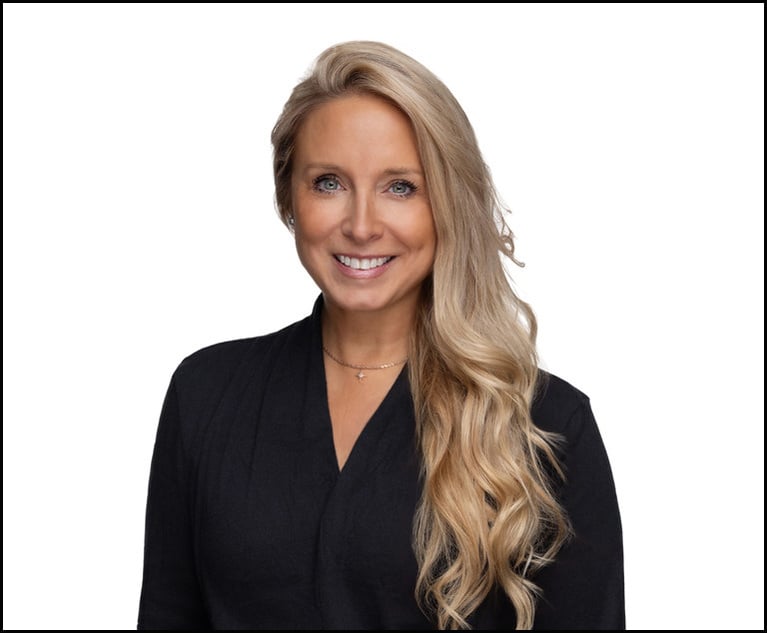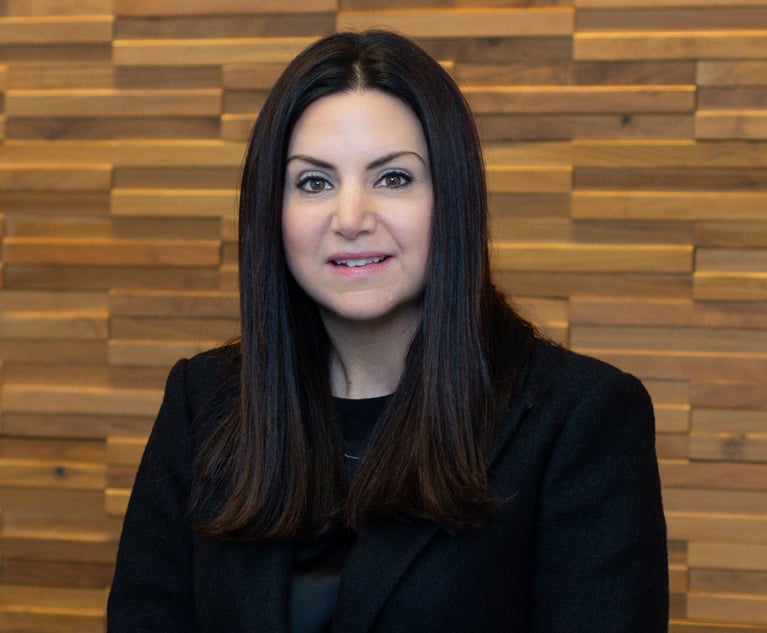Are Bar Associations Still Relevant? Perhaps Now More Than Ever, New Phila. Bar Chancellor Says
At a time when the relevance of bar associations has been called into question, newly installed Philadelphia Bar Association Chancellor Rochelle "Shelli" Fedullo is planning a year designed to reinforce and reinvigorate the organization's value to the legal community for both existing and prospective members.
January 25, 2019 at 03:54 PM
5 minute read
 Philadelphia Bar Association Chancellor Rochelle “Shelli” Fedullo
Philadelphia Bar Association Chancellor Rochelle “Shelli” Fedullo
At a time when the relevance of bar associations has been called into question, newly installed Philadelphia Bar Association Chancellor Rochelle “Shelli” Fedullo is planning a year designed to reinforce and reinvigorate the organization's value to the legal community for both existing and prospective members.
An attorney since 1982 and a longtime litigator and partner with Wilson Elser Moskowitz Edelman & Dicker, Fedullo has been an active member of the Philadelphia Bar Association for decades, having served on the Board of Governors for 10 years, including as chairwoman of the board. She is the organization's 92nd chancellor.
Having had so much experience as a bar association member and leader, Fedullo knows well the benefits of having a network of colleagues to turn to for advice, guidance and encouragement.
As social and professional networking sites such as Facebook and LinkedIn continue to change the way lawyers—especially young lawyers—meet and confer with each other, Fedullo said she believes bar associations provide a crucial avenue for irreplaceable face-to-face interactions.
“The world's a very different place with technology,” she said. “We can connect through social media and we connect in other ways, but I think that human connection—seeing and talking to people—is really, really important. And that's something the association does. You have opportunities to meet people, opportunities to network, that you would not have otherwise.”
But networking is just one the benefits the Philadelphia Bar Association can offer young lawyers, Fedullo said. Another benefit of membership is mentorship.
Fedullo, who speaks of the invaluable guidance and support she received throughout her career from her own professional mentor, retired Philadelphia Court of Common Pleas Judge Sandra Mazer Moss, is seeking this year to improve on and bolster the association's mentoring and professional development initiative.
Fedullo said she believes the bar association can fill a need in that regard for younger lawyers that law firms often can't.
“I think a lot of firms have mentoring initiatives in place and I applaud them because I think it's really helpful to have somebody to watch your back in a firm,” she said, but added that sometimes young attorneys are reluctant to let their guards down and ask questions of more senior lawyers within their own firms.
“It's kind of like the dynamic where [as a partner] you give associates assignments and instead of asking you they ask each other because they don't want to look stupid in front of you,” she said.
Fedullo recalled meeting recently with a group of younger lawyers through the bar association's mentorship initiative and being struck by the questions they came up with in a situation in which they felt they could be candid.
“It was really interesting to me to see what was of interest to them,” she said. “They would ask me things like—and it was a safe place to ask me because I'm not a partner in their firm—'What does my partner really mean when they ask me this?' or 'How do I make them happy? What are the things I need to do to get ahead?'”
But Fedullo said she also believes bar associations have the power to make an impact in the world beyond just the legal communities they serve.
In an intense national and international debate over the sanctity of the rule of law, Fedullo said she wants the Philadelphia Bar Association to have a voice on the issue.
“As lawyers and as the oldest bar association—and I think the most dynamic and best—in the country, I think we need to speak up,” she said, “because if we don't do it as Philadelphia lawyers, who does it?”
To that end, Fedullo is in the process of assembling a Rule of Law Commission within the organization that will identify potential threats to the rule of law and formulate responses to them.
“The rule of law … sounds like an intellectual concept but it's a concept that impacts our lives every day,” she said. “That's why we became lawyers and we need to protect it every day.”
For Fedullo, the concept of the rule of law has very personal implications. And, though she didn't fully grasp this fact at the time, the desire to protect and uphold the rule of law is quite literally the reason she left her career as a teacher and joined the bar, she said.
“My father was a Holocaust survivor and had numbers on his arm,” she said. “It kind of dawned on me, like, 'What really made you [become a lawyer]?' It's because you realize what happens in the world when the rule of law devolves into horror.”
Fedullo said her father's experience is also part of the reason immigration is an issue of particular importance to her.
“I'm the daughter of a refugee and the ideas of sanctuaries and openness are important,” she said. “That's how our country was built.”
And while Fedullo acknowledged that, at 12,000 strong, the Philadelphia Bar Association's membership represents a broad cross-section of political beliefs, some issues are “so fundamental” that they “transcend politics.” It's on those issues that the organization has a duty to use its collective voice to speak out, she said.
“There are certain things that are [at the] core of being American,” she said, adding, “You can't make everybody happy every time, but certain things are just moral imperatives.”
Read More:
For Phila. Bar's New Executive Director, Commitment to Legal Community Is Personal
This content has been archived. It is available through our partners, LexisNexis® and Bloomberg Law.
To view this content, please continue to their sites.
Not a Lexis Subscriber?
Subscribe Now
Not a Bloomberg Law Subscriber?
Subscribe Now
NOT FOR REPRINT
© 2025 ALM Global, LLC, All Rights Reserved. Request academic re-use from www.copyright.com. All other uses, submit a request to [email protected]. For more information visit Asset & Logo Licensing.
You Might Like
View All


Pa. Superior Court Rules Pizza Chain Liable for Franchisee Driver's Crash
4 minute read
Trending Stories
- 1Rejuvenation of a Sharp Employer Non-Compete Tool: Delaware Supreme Court Reinvigorates the Employee Choice Doctrine
- 2Mastering Litigation in New York’s Commercial Division Part V, Leave It to the Experts: Expert Discovery in the New York Commercial Division
- 3GOP-Led SEC Tightens Control Over Enforcement Investigations, Lawyers Say
- 4Transgender Care Fight Targets More Adults as Georgia, Other States Weigh Laws
- 5Roundup Special Master's Report Recommends Lead Counsel Get $0 in Common Benefit Fees
Who Got The Work
J. Brugh Lower of Gibbons has entered an appearance for industrial equipment supplier Devco Corporation in a pending trademark infringement lawsuit. The suit, accusing the defendant of selling knock-off Graco products, was filed Dec. 18 in New Jersey District Court by Rivkin Radler on behalf of Graco Inc. and Graco Minnesota. The case, assigned to U.S. District Judge Zahid N. Quraishi, is 3:24-cv-11294, Graco Inc. et al v. Devco Corporation.
Who Got The Work
Rebecca Maller-Stein and Kent A. Yalowitz of Arnold & Porter Kaye Scholer have entered their appearances for Hanaco Venture Capital and its executives, Lior Prosor and David Frankel, in a pending securities lawsuit. The action, filed on Dec. 24 in New York Southern District Court by Zell, Aron & Co. on behalf of Goldeneye Advisors, accuses the defendants of negligently and fraudulently managing the plaintiff's $1 million investment. The case, assigned to U.S. District Judge Vernon S. Broderick, is 1:24-cv-09918, Goldeneye Advisors, LLC v. Hanaco Venture Capital, Ltd. et al.
Who Got The Work
Attorneys from A&O Shearman has stepped in as defense counsel for Toronto-Dominion Bank and other defendants in a pending securities class action. The suit, filed Dec. 11 in New York Southern District Court by Bleichmar Fonti & Auld, accuses the defendants of concealing the bank's 'pervasive' deficiencies in regards to its compliance with the Bank Secrecy Act and the quality of its anti-money laundering controls. The case, assigned to U.S. District Judge Arun Subramanian, is 1:24-cv-09445, Gonzalez v. The Toronto-Dominion Bank et al.
Who Got The Work
Crown Castle International, a Pennsylvania company providing shared communications infrastructure, has turned to Luke D. Wolf of Gordon Rees Scully Mansukhani to fend off a pending breach-of-contract lawsuit. The court action, filed Nov. 25 in Michigan Eastern District Court by Hooper Hathaway PC on behalf of The Town Residences LLC, accuses Crown Castle of failing to transfer approximately $30,000 in utility payments from T-Mobile in breach of a roof-top lease and assignment agreement. The case, assigned to U.S. District Judge Susan K. Declercq, is 2:24-cv-13131, The Town Residences LLC v. T-Mobile US, Inc. et al.
Who Got The Work
Wilfred P. Coronato and Daniel M. Schwartz of McCarter & English have stepped in as defense counsel to Electrolux Home Products Inc. in a pending product liability lawsuit. The court action, filed Nov. 26 in New York Eastern District Court by Poulos Lopiccolo PC and Nagel Rice LLP on behalf of David Stern, alleges that the defendant's refrigerators’ drawers and shelving repeatedly break and fall apart within months after purchase. The case, assigned to U.S. District Judge Joan M. Azrack, is 2:24-cv-08204, Stern v. Electrolux Home Products, Inc.
Featured Firms
Law Offices of Gary Martin Hays & Associates, P.C.
(470) 294-1674
Law Offices of Mark E. Salomone
(857) 444-6468
Smith & Hassler
(713) 739-1250





